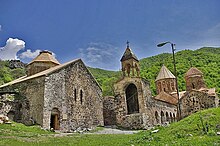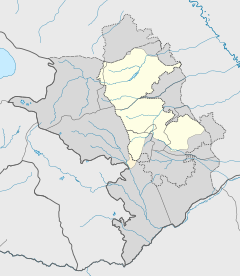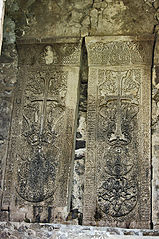| Revision as of 22:40, 11 November 2020 view sourceAntonSamuel (talk | contribs)Extended confirmed users, Page movers14,076 edits Some corrections, updates, clean up← Previous edit | Revision as of 13:26, 12 November 2020 view source TurkMilliyetci (talk | contribs)29 editsNo edit summaryTags: Reverted Visual edit: SwitchedNext edit → | ||
| Line 37: | Line 37: | ||
| }} | }} | ||
| '''Dadivank''' ({{lang-hy|Դադիվանք}}), also '''Khutavank''' ({{lang-hy|Խութավանք|translation=monastery on the hill}}<ref>Жеан-Паул Лабурдетьте, Доминикуе Аузиас, Армения, Petit Futé, 2007 – p. 203</ref>), is an Armenian<ref>Robert G. Ousterhout. A Byzantine settlement in Cappadocia. — ], 2006. — p. 151."''In the Armenian monastery of Dadivank', however, dated 1211, a four-columned, domed hall is set into a range of rooms chat included the kitchen and refectory.''"</ref><ref>"Dadivank", one of the best known Armenian monasteries in Arts'akh (Nagorno - Karabakh)" // Journal of the Society for Armenian Studies (California State University), 1995, vol.6-7, p. 51</ref> ] in the ] of the |
'''Dadivank''' ({{lang-hy|Դադիվանք}}), also '''Khutavank''' ({{lang-hy|Խութավանք|translation=monastery on the hill}}<ref>Жеан-Паул Лабурдетьте, Доминикуе Аузиас, Армения, Petit Futé, 2007 – p. 203</ref>), is an Armenian<ref>Robert G. Ousterhout. A Byzantine settlement in Cappadocia. — ], 2006. — p. 151."''In the Armenian monastery of Dadivank', however, dated 1211, a four-columned, domed hall is set into a range of rooms chat included the kitchen and refectory.''"</ref><ref>"Dadivank", one of the best known Armenian monasteries in Arts'akh (Nagorno - Karabakh)" // Journal of the Society for Armenian Studies (California State University), 1995, vol.6-7, p. 51</ref> ] in the ] of the ]. Its in the disputed region of Nagorno-Karabakh where the de-facto state of the ]<ref>https://www.bbc.com/news/world-europe-54324772#:~:text=Nagorno-Karabakh%20is%20part%20of,with%20a%20ceasefire%20in%201994.</ref> claim sovereignity over it. It was built between the 9th and 13th centuries. | ||
| == History and architecture == | == History and architecture == | ||
Revision as of 13:26, 12 November 2020
| Dadivank Դադիվանք | |
|---|---|
 The monastery of Dadivank The monastery of Dadivank | |
| Religion | |
| Affiliation | Armenian Apostolic Church |
| Location | |
| Location | Shahumian Region, Nagorno-Karabakh Republic (de facto); Azerbaijan (de jure) |
 | |
| Geographic coordinates | 40°09′42″N 46°17′18″E / 40.1616°N 46.2882°E / 40.1616; 46.2882 |
| Architecture | |
| Type | Monastery, Church |
| Style | Armenian |
| Completed | 9th–13th centuries |
Dadivank (Template:Lang-hy), also Khutavank (Template:Lang-hy), is an Armenian monastery in the Shahumian Region of the Republic of Azerbaijan. Its in the disputed region of Nagorno-Karabakh where the de-facto state of the Republic of Artsakh claim sovereignity over it. It was built between the 9th and 13th centuries.
History and architecture
The monastery was founded by St. Dadi, a disciple of Thaddeus the Apostle who spread Christianity in Eastern Armenia during the first century AD. However, The monastery was first mentioned in the 9th century. In July, 2007, the grave of St. Dadi was discovered under the holy altar of the main church. The princes of Upper Khachen are also buried at Dadivank, under the church's gavit.
The Monastery belongs to the Artsakh Diocese of the Armenian Apostolic Church, and consists of the Cathedral church of St. Astvadzadzin, the chapel and a few other buildings. The main church has Armenian script engraved into its walls, in addition to several 13th century frescoes. The bas-relief on the south facade of the cathedral at Dadivank, built in 1214, shows the princess offering the church in memory of her sons. According to Paolo Cuneo, Dadivank is one of two Monasteries along with Gandzasar where bust motifs (possibly the donors of the monasteries) can be found.
On 8 October 2001, motion 9256 was proposed (but not discussed, let alone approved) at the Parliamentary Assembly of the Council of Europe on behest of sixteen parliamentary members. According to the motion, "the destruction of Zar (Tsar) monuments in the Kelbajar region, Dadivank, which the local Muslim population regarded as remnants of the Armenian Christian religion and ruined the monastery as it could".
Restoration
In 1994, following the end of the Nagorno-Karabakh war, the monastery was reopened, and in 2004, a renovation process began with funding from Armenian-American businesswoman Edele Hovnanian, ending in 2005. The restoration efforts restored the cathedral, along with a chapel which was restored by Edik Abrahamian, an Armenian from Tehran, Iran.
In August 2017, Italian specialists who had previously conducted restoration operations at Davidank returned to continue their cleaning and restoration of the monastery. They had already restored of the four chapels and their frescoes, and were now planning to restore inscriptions and ornaments near the doors to the chapels. The entire restoration project is planned to be completed by 2020.
However, as a result of Nagorno-Karabakh War (2020) which resulted in a cease-fire agreement stipulating an Armenian withdrawal from Dadivank and a hand-over of the surrounding area to Azerbaijan, the Abbot of the Dadivank Monastery decided to bring the monastery's Christian art of significance to Armenia.
Gallery
-
 Dadivank
Dadivank
-
 General view
General view
-
 Side view
Side view
-
 Khachkars at Dadivank
Khachkars at Dadivank
See also
Books
- (in French) Le Petit Futé Arménie – by Dominique Auzias, Jean-Paul Labourdette – 2009 – 330 pages
- Armenologie in Deutschland, by Armenuhi Drost-Abgarjan, Hermann Goltz – 2005 – p. 59
- (in Italian) Documenti di architettura armena, Alexandr L. Jakobson – 1986 – 73 p.
References
- Жеан-Паул Лабурдетьте, Доминикуе Аузиас, Армения, Petit Futé, 2007 – p. 203
- Robert G. Ousterhout. A Byzantine settlement in Cappadocia. — Dumbarton Oaks, 2006. — p. 151."In the Armenian monastery of Dadivank', however, dated 1211, a four-columned, domed hall is set into a range of rooms chat included the kitchen and refectory."
- "Dadivank", one of the best known Armenian monasteries in Arts'akh (Nagorno - Karabakh)" // Journal of the Society for Armenian Studies (California State University), 1995, vol.6-7, p. 51
- https://www.bbc.com/news/world-europe-54324772#:~:text=Nagorno-Karabakh%20is%20part%20of,with%20a%20ceasefire%20in%201994.
- В старинном монастыре Нагорного Карабаха обнаружены мощи одного из учеников Иисуса Христа
- Georgia, Armenia and Armenia, by John Noble, Michael Kohn, Danielle Systermans, Lonely Planet, 2008 – 364 pages, p. 307
- Lydia А. Durnovo, Essays on the Fine Arts of Medieval Armenia. Moscow. 1979.
- Treasures from the ark: 1700 years of Armenian Christian art, by Vrej Nersessian, British Library, 2001 – 240 pages
- Paolo Cuneo, Architettura Armena, Roma, 1988, pp. 450, 761, cited by. ALPAGHIAN: Raccolta di scritti in onore di Adriano Alpago Novello, Italy, 2005
- "Doc. 9256 - Parliamentary Assembly of the Council of Europe". Retrieved 13 June 2017.
- http://www.raa.am/Magazine/Activity/FR_set_E_Activity.htm Restoration in Dadivank
- https://news.am/eng/news/403138.html Italian specialists to arrive in Karabakh to continue Dadivank Monastery restoration
- https://news.am/eng/news/612601.html
External links
- Dadivank Monastery
- Dadivank Gallery
- Recent Historical-Architectural Research on Dadivank
- Gandzasar.com: Pilgrimage and Tourism, Nagorno Karabakh Republic
- Dadivank Monastery at wikimapia.org
- Program about Dadi Monastery by Vem Radio



